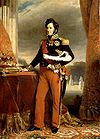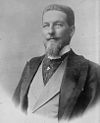- Orléanist
-
The Orléanists were a French right-wing/center-right party which arose out of the French Revolution. It governed France 1830-1848 in the "July Monarchy" of king Louis Philippe. It is generally seen as a transitional period dominated by the bourgeoisie and the conservative Orleanist doctrine in economic and foreign policies. The chief leaders included Prime Minister François Guizot. It went into exile during the reign of Emperor Napoleon III and collapsed with the establishment of the Third Republic in 1870.
It took its name from the Orléans branch of the House of Bourbon (descended from the youngest son of Louis XIII), who were its leaders. The faction comprised many liberals and intellectuals who wanted to restore the monarchy as a constitutional monarchy with limited powers for the king and most power in the hands of parliament. Orleanists were opposed by the more conservative Bourbon faction, who wanted the heirs of Louis XVI restored to the throne with great powers. Both Orleanists and Bourbons were opposed by republicans who wanted no king at all.
Contents
Origins
During the early period of the French Revolution, Louis Philippe Joseph, Duke of Orléans, who disliked King Louis XVI and Queen Marie Antoinette, naturally assumed the position of a spokesman of the liberal royalists. It was a short step from this position to the attitude of liberal candidates for the throne, which Philippe's son Louis Philippe eventually would achieve.
The Orléanists aimed politically to find a common measure for the monarchical principle and the "rights of man" as set forth by the revolutionary leaders in 1789 and the princes of the branch of Orléans became the advocates of this attempted compromise.
The elder Bourbon branch (as represented by Louis XVIII and later by its last scion, Henri, Comte de Chambord) was prepared to grant (octroyer) a charter of liberties or constitution, but insisted that they ruled by "divine right" and conferred these liberties on their subjects of their own free will.
The Bourbons' feudal language offended many Frenchmen, who concluded that rights granted as a favour were always subject to revocation as a punishment. Therefore those of them who considered a monarchical government as more beneficial to France than a republic, but who were not disposed to hold their freedom subject to the pleasure of one man, became either Bonapartists who professed to rule by the choice of the nation, or supporters of the Orléans princes who were ready to reign by an "original compact" and by the will of the people. The difference therefore between the supporters of the elder line, or Legitimists, and the Orléanists became profound, for it went down to the very foundations of government.
French Revolution
The first generation of Orléanists were swamped in the turmoil of the Revolution. Philippe himself, who under the Republic, had assumed the name Philippe Égalité and voted for the King's execution, yet was guillotined himself in 1793.
Despite this setback, according to Albert Sorel, the Orléanists subsisted under the First French Empire, and resurfaced when the revival of liberalism overthrew the restored legitimate monarchy of Louis XVIII and Charles X.
Restoration (1815-1830)
After the restoration of the Bourbons (1815), the liberals were identified with the Orléanists, who rejected the legitimism of the elder branch as well as Bonapartism, which in their view was essentially "democratic Caesarism" - an equal submission of all men to one despotic ruler.
As equality before the law and in social life, which had been far dearer to Frenchmen of the revolutionary epoch than political freedom, seemed secured, the next step was aiming as political freedom. This happened under the guidance of men who were Orléanists because the Orléans princes seemed to them to offer the best guarantee for such a government.
The liberals who were Orléanists found their leaders in men eminent in letters and in practical affairs—François Pierre Guillaume Guizot, Adolphe Thiers, Achille Charles Léon Victor, duc de Broglie and his son Jacques Victor Albert, the banker Jacques Laffitte and many others.
When the July Revolution of 1830 resulted in the downfall of the elder Bourbon branch, the Orléanists stepped in. Louis-Philippe, Duke of Orléans, who became King, marked a profound change by assuming the title of a "King of the French" (instead of the traditional "King of France and Navarre". That king appeared as the chief of the people by compact with the people, and not by "divine right".
Orléanist rule (1830-1848)
The Orléanists, in their dislike of "divine right" on the one hand, and their fear of democracy, which they were convinced would result in Caesarism or a return to Bonapartism, turned for examples of a free government to Britain, a monarchy governing constitutionally based on parliamentary representation of the middle classes. They endeavoured to establish the like in France under the name of a juste-milieu, a via media between absolutism and democracy.
The French equivalent for the English middle-class constituencies was to be a pays legal of about a quarter of a million of voters by whom all the rest of the country was to be "virtually represented". Guizot expounded and carried out this doctrine with uncompromising rigour. The Orléanist monarchy became so thoroughly middle-class that the nation outside of the pays legal ended by regarding the government as a privileged class less offensive, but also a great deal less brilliant, than the aristocracy of the old monarchy.
Later history
Second Republic (1848-1852)
The revolution of 1848, partly due to errors of conduct in individual princes and politicians but mainly to the resentment of those excluded from the pays legal, swept the Orléanist party from power after eighteen years. The Orléanists indeed continued throughout the Second Republic (1848–1852) and the Empire (1852–1870) to enjoy a marked social and literary prestige, on the strength of the wealth and capacity of some of their members, their influence in the Académie française and the ability of their organs in the press—particularly the Revue des deux mondes, the Journal des débats, and the papers directed by E. Hervé.
Second Empire (1852-1870)
During the Second Empire, which evolved from the Second Republic, the discreet opposition of the Orléanists, exercised for the most part with infinite dexterity and tact, by reticences, omissions, and historical studies in which the Empire was attacked under foreign or ancient names, was a perpetual thorn in the side of Napoleon III. Yet they possessed little hold on the country outside a cultivated liberal circle in Paris.
Third Republic (1870-1940)
When the Second Empire was swept away by the German War of 1870-1871, the people, in disgust at the Bonapartists and its fear of the Republicans, chose a great many royalists to represent it in the Assembly which met in Bordeaux on 12 February 1872. In this body, the Orléanists again exercised a kind of leadership by virtue of individual capacity, but they were counterbalanced by the Legitimists.
This enabled President Adolphe Thiers, himself an Orléanist, to impose the Third Republic on the unwilling majority of the Assembly. Orléanists and Legitimists cooperated to expel Thiers from power on 24 May 1873.
After this, the Orléanists sought a fusion with the Legitimists to strengthen the royalist cause. As far back as 1850, Guizot had thought of proposing a fusion, but under the condition that the Comte de Chambord would desist from claiming rule by "divine right". When a fusion was arranged in 1873 it stood on quite another footing. After exchanging notes and conferences in committee rooms and drawing-rooms, Philippe, Comte de Paris, the representative of the Orléanists, sought an interview with Henri, Comte de Chambord at Frohsdorff, stating that he came not only to pay his respects to the head of his house but also to "accept his principle" (though Orléanists sometimes assert that this statement was given with mental reservations). However no final agreement was reached.
Republican gains in the elections of 1876 and the crisis of 16 May 1877 ended the royalist dominance. In 1883, the death of the Comte de Chambord ended the elder Bourbon branch and left the Comte de Paris as head of the Royal house of France.
However, the party ceased to exist as an independent political organisation, as many supporters progressively rallied to the Republic, while radical right wing groups, particularly Action Française espoused the house of Orléans as the only way to rescue France from what they perceived to be the corruption of the Republic.
Although the Orléanists were given a new vitality, the initiative passed to other organisations who although sincere monarchists also had other agendas. The Orléanist cause ceased to be that of moderation between the extremes of the Bourbons and the Republicans.
Fifth Republic (1958-present)
Under the Fifth Republic, presidents Valéry Giscard d'Estaing and Jacques Chirac have both been classed on the Orléanist tradition of the three French right-wing families identified by historian René Rémond (Bonapartism and Legitimism being the two others).[1]
Orléanist Principles of Succession
Orléanist claims follow these principles:
- The Crown descends to males born in the male line of Hugh Capet.
- The succession normally passes by primogeniture in the male line.
- Only children born of legal marriages conforming with the canon law of the Catholic Church are dynasts.
- The Sovereign or Head of the House must be Roman Catholic.
- The Sovereign or Head of the House must be French and inherit succession rights through a dynast of French nationality.
- Rules of succession to the Crown are governed by the Constitution and/or laws of the realm.
List of Orléanist Claimants to the French throne since 1848
Claimant Portrait Birth Marriages Death Louis Philippe I
1830-1848
6 October 1773
Palais-Royal
son of Louis Philippe II, Duke of Orléans and Louise Marie Adélaïde de BourbonMaria Amalia of the Two Sicilies
1809
10 children26 August 1850
Chapelle royale de Dreux
aged 76Philippe, Comte de Paris
"Philippe VII"
1850-1894
24 August 1838
Paris
son of Prince Ferdinand Philippe, Duke of Orléans and Duchess Helen of Mecklenburg-SchwerinPrincess Marie Isabelle d'Orléans
1864
8 children8 September 1894
Stowe House
aged 56Philippe, duc d'Orléans
"Philippe VIII"
1894–1926
24 August 1869
York House, Twickenham
son of Philippe, Comte de Paris and Princess Marie Isabelle d'OrléansArchduchess Maria Dorothea of Austria
5 November 1896
No children28 March 1926
Paris
aged 56Jean, Duc de Guise
"Jean III"
1926–1940
9 October 1875
France
son of Robert, Duke of Chartres and Marie-Françoise of OrléansIsabelle of Orléans
30 October 1899
4 children25 August 1940
Larache, Spanish Morocco
aged 65Henri, Comte de Paris
"Henri VI"
1940–1999
5 July 1908
Chateau de Nouvion-en-Thiérache, Aisne, France
son of Jean, Duc de Guise and Isabelle of OrléansIsabelle of Orléans-Braganza
8 April 1931
11 children19 June 1999
Chérisy
aged 90Henri, Comte de Paris, Duc de France
"Henri VII"
1991-TodayJune 14, 1933
Woluwe-Saint-Pierre, Belgium
son of Henri, Comte de Paris and Isabelle of Orléans-BraganzaDuchess Marie Therese of Württemberg (up to 3 February 1984) Micaela Cousiño Quiñones de León (current spouse)
July 5, 1957(first marriage)October 31, 1984 current marriage
5 childrenAlive.
age 76References
- ^ Alain-Gérard Slama, "Vous avez dit bonapartiste?" in L'Histoire n°313, October 2006, pp.60-63 (French)
Sources
 This article incorporates text from a publication now in the public domain: Chisholm, Hugh, ed (1911). Encyclopædia Britannica (11th ed.). Cambridge University Press.
This article incorporates text from a publication now in the public domain: Chisholm, Hugh, ed (1911). Encyclopædia Britannica (11th ed.). Cambridge University Press.- Aston, Nigel. "Orleanism, 1780-1830," History Today, Oct 1988, Vol. 38 Issue 10, pp 41–47
- Beik, Paul. Louis Philippe and the July Monarchy (1965)
- Collingham, H.A.C. The July Monarchy: A Political History of France, 1830–1848 (Longman, 1988)
- Howarth, T.E.B. Citizen-King: The Life of Louis Philippe, King of the French (1962).
- Newman, Edgar Leon, and Robert Lawrence Simpson. Historical Dictionary of France from the 1815 Restoration to the Second Empire (Greenwood Press, 1987) online edition
See also
Categories:- Groups of the French Revolution
- Political parties established in 1789
- Monarchism in France
- July Monarchy
- House of Orléans
- Pretenders to the French throne
- 1789 establishments in France
Wikimedia Foundation. 2010.
